Cleaning quartz worktops – How to tend to surfaces using a quartz worktop cleaner?
It is true that granite or quartz worktops aren’t demanding materials when it comes to care or maintenance. They are durable and sleek, therefore usually all it takes is a gentle wipe to clean all stains away.
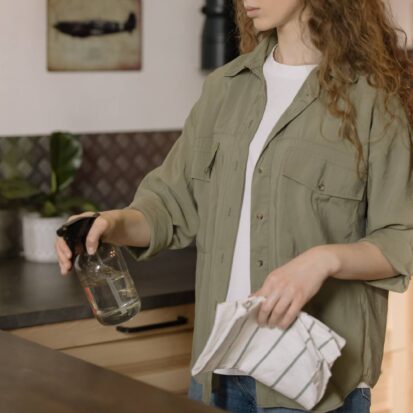
This does not mean, however, that we can completely ignore the process of cleaning it properly.
Proper care for your stone worktop is vital because incorrect or insufficient cleaning might cause your quartz kitchen worktops to deteriorate over time.
So, before you decide to install quartz worktops at your property, it is worth to familiarise yourself with the do’s and don’ts when it comes to kitchen worktop maintenance.
And don’t worry, if you choose us as a provider of your quartz kitchen worktops, we will provide you with all necessary information or paperwork regarding maintenance. This blog is dedicated to those who haven’t yet purchased a quartz worktop.
What are the best ways to clean and shine quartz worktops?
Let’s begin by stating that quartz is a product formed by combination of natural stone particles, usually quartz, with a special binder, usually polyester resin, which only makes up for 5% of the material.
It is the binder that gives the conglomerate surface a shiny, smooth, and non-porous texture that perfectly prevents dirt from settling on the material. Thanks to this quality, caring for quartz countertops and other elements made of quartz is not a tough task – the additives make the quartz surface resistant to scratches, liquids and even high heat.
As such, quartz worktops are very easy to maintain. It’s usually not a struggle to remove even few-days-old stains, and in many cases, no special agents are requred.
Tending to your quartz worktop without a quartz worktop cleaner:
Step 1: Wipe the quartz worktops with mild dish soap and soft cloth
Take a soft cloth or sponge and dip it in warm water with the soap mixture. Take the lint-free microfibre cloth and begin to clean your quartz worktop from the spills. Do this gently and firmly, until all stains are gone. Wipe away the stubborn stains as often as you need to.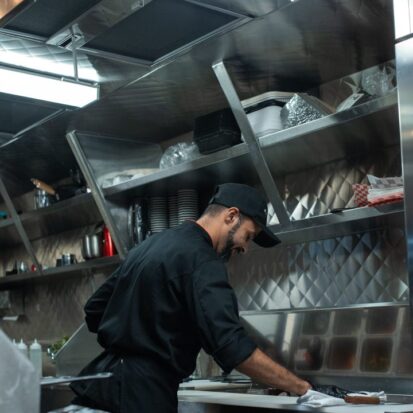
Step 2: Scrape the dried ooze off the quartz surface
We recommend using a wooden/plastic spatula to scrape off any hardened dirt or food. Be careful and scrape gently if you are removing excess sediment. For easy and quick access, we recommend keeping the spatula in a nearby drawer so you can grab it when you need to remove the irksome build-up from your quartz worktops.
We know that restaurants and heavy-duty cooking stations will face this challenge more often than independent kitchens, so wooden/plastic spatulas are a must buy!
Step 3: Wipe off the grease with a degreaser
Take a degreaser of your choice (make sure it’s safe to use on quartz) and spray it generously on your quartz countertops. This could be anything, from soap to standard anti-bac all-purpose cleaner and such. Whatever you use, be sure that the spray does not contain bleach, as this can damage the colour quality of your kitchen worktops from quartz.
If you are going to use disinfecting wipes, they must not contain bleach either. Afterwards, you’ll want to immediately rinse the surface with a sponge or wet towel, that’ll be enough to get the job done.
What cleaners are safe to use on quartz?
Granite and quartz worktop care is one of the most important priorities after acquiring a work surface. Right after the specific granite worktop is fitted, it is impregnated by our specialist fitters. Thus the micro gaps on the natural stone surface of the worktop are sealed – the impregnator prevents all liquids penetrating the surface. More on that here.
When it comes to quartz, no regular impregnation with sealants is required. As we mentioned above, the synthetic stone is made in such a particular way, that forever-sealants are embedded inside the kitchen worktop.
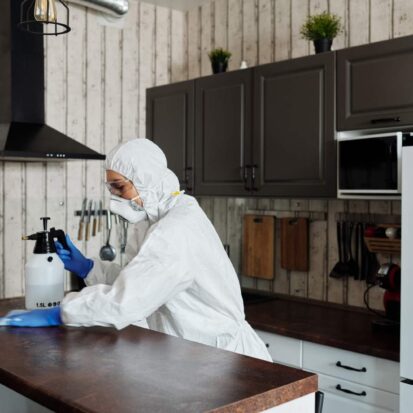
Thanks to this high technology, a completely new layer of protection is created, preventing dirt and liquids from getting inside, but more importantly preventing any major staining, decolouring or fading.
Regardless, quartz worktops are not indestructible. They are still vulnerable to damage, although it is very hard to generate this damage. We list everything below that you should be aware of prior to purchasing your stone countertop.
- A crucial thing to remember is to avoid cleaners that contain any harmful acids. This includes citric acid, formic acid, phosphoric acid, acetic acid and hydrochloric acid etc. Cleaning products that contain any of the mentioned acids are often aimed at harsh stains placed on the surfaces, or sediment etc. Using them on a granite or quartz worktops might damage these surface and in the long term, it could grind away or tarnish the beautiful shine that is inherent to these tops.
- Bear in mind that that all bleaches are very harmful for synthetic stone, like quartz, but even more so to natural stone worktops, like granite or marble. Any agents that contain this, should be avoided.
- It is generally safe to use ordinary washing up liquid, though it isn’t recommended if you’re often using your worktop as a direct stand for hot pots and pans. When that happens, and residues of washing up liquid are still on the counter, then it can reduce the effectiveness of their durability and enhance the effect of rings that might be left behind by boiling cookware and utensils.
- Products that are neutral for marble or granite are those which pH is equal to 7. This is important as substances even with ph5 might harm the structure of the worktop. It always depends on the brand, the colour, the batch of the product. For further insight, we highly recommend you contact our professional staff or one of our other blogs.
- It is always the best to use either simply warm water and lint-free microfibre cloth or specialised products to clean your quartz surface, but especially when considering marble as it is the most sensitive stone material. The water used for marble should neither be distilled nor mineral, as this may cause slight decolouration, although very unlikely.
- You have to remember that liquids and substances which include silicone oils should be avoided. This may include products that are aimed at cleaning either glass or furniture etc. They may not harm the stone worktops permanently, and any effects might be soon over time, but we want to decrease that risk, if not eliminate it completely.
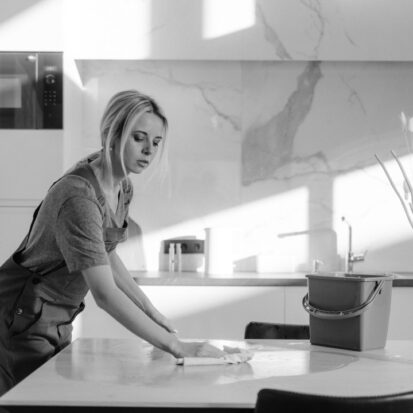
- Another chemical cleaners which you should avoid are products that are aimed for cleaning ovens, consisting of high levels of baking soda and potassium chemicals. Unlike the minor products that we mentioned before, these can be a major harm to your worktop, spoiling the surface and causing huge decolouring and staining damages. Irreparable damage essentially, that even our professional masons couldn’t fix.
- Quartz , marble and granite counter tops cannot have contact either with petrol or dense oils, as these have the same negative effects as the oven cleaning products – they might permanently harm the worktops.
- And above all costs, be sure you always clean with gentle cloths, sponges or paper towels. Do not, at all cost, use steel wool, bbq cleaning brushes or other hard scrubbers that might not scratch the surface, but can in turn cause irritation of the gloss, which in turn could cause some porosity.
FAQ
What is the best thing to clean quartz worktops with?
In all honesty, the best way to get the grime, dirt or grease off of your quartz worktops is to use a damp cloth and a small dollop of dish soap, like Fairy liquid.
Once that is done, your worktop should be clean, but on some quartz colours, especially the darker shades like Marquina, Black Shimmer, Azabache or Black Mirror, washing-up liquid might leave behind a streak residue.
If that happens, we would strongly recommend to use a proper quartz worktop cleaner e.g CRL Stone Solid Surface Cleaner – it can be purchased on CRL’s website for a cheap price; alternatively, you can buy it in our showroom.
The good thing with these quartz cleaning agents is that they last a long time, because you only need to spray the quartz worktop once or twice for it to take effect.
And remember, when you use this spray, ditch the damp cloth. At that point, you should switch to paper towel or a fibrecloth, then gently rub the spray into the quartz worktops.
The procedure of cleaning with an agent is very simple. The question below answers it all.
How do you keep quartz clean and shiny?
The procedures of keeping your quartz worktops clean are very simple.
- Drop a dollop of Fairy Liquid onto a damp microfibre cloth
- Polish the surface until all the kitchen worktops are clean and wet
- Dry the kitchen worktop either with a towel or paper towel
- Spray some of the CL Stone Surface Cleaner onto the quartz worktops
- Rub the spray into the surfaces with a dry paper towel, removing all streaks and marks
- Voila, the quartz kitchen worktops should be clean, fresh and glossy!
Can you use fairy liquid on quartz?
Absolutely – use washing up liquids of all brands and types, as long as they’re not acidic in composition. But even then, most common household agent acids will not harm a quartz kitchen worktop. 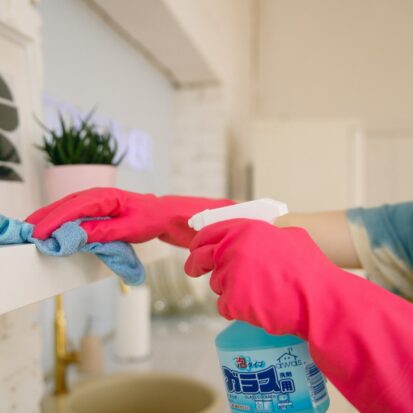
Fairy liquid is fantastic at quickly removing all stains, grease streaks, grime or food residue. It’s a cheap solution, and when combined with warm water and a damp cloth, it can work miracles when it comes to cleaning you kitchen surface.
Just be sure to always dry such surface clean, as soapy streaks can emerge on the surface. We’d also recommend to dry the worktop and polish it with a special quartz polishing spray or quartz cleaner, to fully give the surface that glossy, shiny, mirror-like texture.
What cleaners should not be used on quartz?
As already mentioned in this blog, anything that contains bleach, baking soda, potassium chemicals. Any oven cleaners or harsh bathroom cleaners used for ceramic surfaces. You should also avoid harsh steel wool or metallic scrubbers, relying only on soft sponges and microfibre cloths.
Depending on the brand of your quartz worktop, some products may be vulnerable to specific types of acid. The resistance will be dictated by colour and brand. Just in case however, the citric acid, formic acid, phosphoric acid, acetic acid and hydrochloric acid should be avoided from contact with your kitchen worktop.
How do you clean dirty quartz?
It’s very simple. Rely on simple dish soap and a damp cloth – cleaning your worktops with those two will complete 80% of the entire process. If you have time afterwards, we’d highly recommend to use a specialist quartz cleaner product, like the Stone Solid Surface Cleaner (which can be purchased in our showroom), to grant the worktops an extra shine and gloss.
That is all. If you incorporate that tactic, you worktop cleaning process shouldn’t take more than 5-10 minutes.
